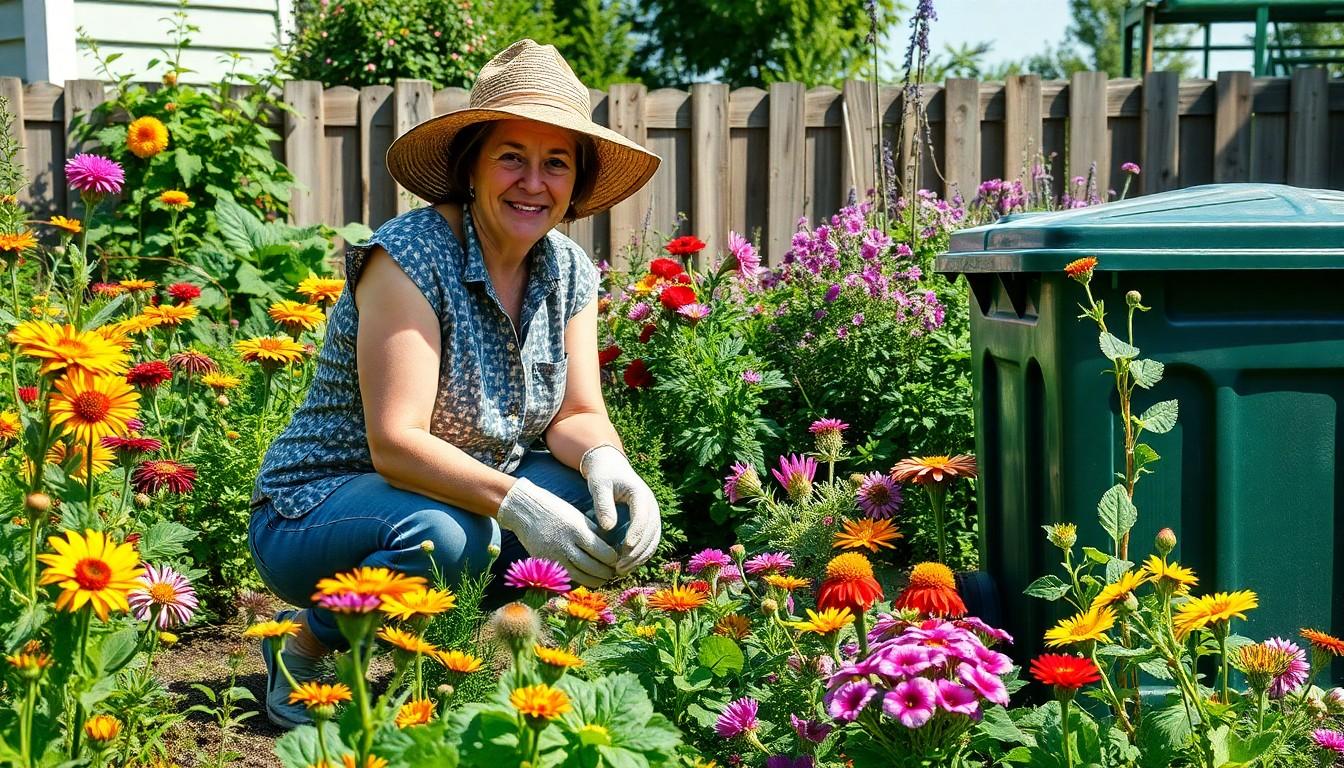Phone:
(701)814-6992
Physical address:
6296 Donnelly Plaza
Ratkeville, Bahamas.

Imagine stepping into your backyard and being greeted by a lush paradise of vibrant vegetables and fragrant herbs, all thriving without a hint of synthetic chemicals. Organic backyard gardening isn’t just a trend; it’s a delicious way to reconnect with nature while ensuring your plate is filled with the freshest produce. Who wouldn’t want to munch on a salad that didn’t come with a side of pesticides?
Organic backyard gardening involves growing plants without synthetic fertilizers, pesticides, or genetically modified organisms. This method focuses on cultivating healthy, chemical-free vegetables, fruits, and herbs for personal consumption. Sustainability plays a key role, as gardeners prioritize natural growing techniques to enhance soil quality and ecosystem health.
Soil health remains essential in organic gardening. Organic compost and natural fertilizers, such as manure or worm castings, improve nutrient levels. Insects serve as indicators of biodiversity, benefiting plants through natural pest control. Crop rotation, companion planting, and cover crops further cultivate robust organic practices.
Native plants often flourish in organic gardens. They adapt well to local conditions and support regional wildlife. Planting varieties that thrive in specific climates offers higher success rates and fewer diseases. Additionally, understanding local soil types and conditions aids in selecting appropriate plants for cultivation.
Water conservation stands as another focus in organic gardening. Techniques like drip irrigation and rainwater collection maximize water efficiency. Mulching retains soil moisture and suppresses weeds, reducing the need for manual labor and chemical herbicides.
Incorporating organic principles fosters a deeper connection with nature. Gardeners grow a sense of community by sharing knowledge and produce with neighbors. This practice not only enriches diets but also promotes environmental stewardship. Embracing organic backyard gardening enriches lifestyle choices by providing fresh, nutritious food directly from home gardens.

Organic backyard gardening offers numerous advantages, from environmental benefits to personal health improvements. Engaging in this practice creates a healthier lifestyle while fostering a deeper appreciation for sustainable food sources.
Organic gardening significantly reduces chemical runoff, promoting healthier ecosystems. Soil quality improves as gardeners use compost and natural fertilizers to enhance nutrients. Wildlife flourishes when organic practices encourage the growth of native plants, creating habitats for beneficial insects and pollinators. Water conservation is achievable through drip irrigation, minimizing waste while supporting plant health. Communities also benefit from increased green spaces, which help combat urban heat and improve air quality.
Consuming organic vegetables and herbs directly from a garden offers superior nutrition. Higher levels of vitamins and antioxidants characterize organic produce, contributing to better overall health. Avoiding synthetic pesticides ensures that food remains free from harmful chemicals. Physical activity involved in gardening promotes cardiovascular health and strengthens muscles. Additionally, growing a diverse range of plants can enhance dietary variety, leading to improved gut health and well-being.
Investing in an organic garden proves cost-effective in the long run. Homegrown produce reduces reliance on store-bought, often overpriced organic food. Gardening supplies can often be sourced locally, lowering initial setup costs. Plus, composting reduces waste while creating a sustainable fertilizer source. By growing herbs and vegetables at home, individuals save money on grocery bills while enjoying fresher, tastier options.
Organic backyard gardening begins with understanding essential steps for a successful setup. This practice encourages individuals to cultivate gardens filled with fresh produce while respecting the environment.
Selecting an optimal garden location requires consideration of sunlight, accessibility, and drainage. Sunlight directly influences plant growth; aim for a spot that receives at least six hours of sunlight daily. Accessibility eases maintenance tasks, while proper drainage prevents waterlogging. Gardeners should also consider proximity to water sources and the ability to protect plants from strong winds. Inspect the area for existing trees or structures that might cast shadows, which can impede growth.
Soil preparation forms the foundation of a healthy garden. First, gardeners should test soil for pH levels and nutrient content, ensuring it meets the needs of chosen plants. Adding organic matter such as compost improves soil structure and fertility. Turning soil to a depth of at least 12 inches helps incorporate nutrients effectively. Mulching reduces weeds and conserves moisture. Regularly aerating soil enhances oxygen flow, promoting root development and overall plant health.
Choosing organic seeds and plants plays a crucial role in a successful garden. Prioritize certified organic seeds that have not been treated with harmful chemicals. Native plants often adapt better to local conditions, requiring less maintenance and attracting beneficial wildlife. Consider selecting heirloom varieties for diverse flavors and resilience. Research plant compatibility to ensure successful companion planting, which promotes growth and deters pests. Always source seeds from reputable suppliers to guarantee quality and authenticity.
Maintaining an organic backyard garden requires consistent attention to various aspects that promote plant health and productivity.
Effective watering techniques play a crucial role. He or she should focus on deep watering rather than frequent shallow watering, which encourages strong root growth. Drip irrigation systems deliver water directly to the base of plants, minimizing waste and evaporation. Rainwater harvesting offers a sustainable option that conserves resources. Handwatering can also be efficient, especially in small gardens, allowing for precise control over moisture levels. Monitoring soil moisture helps determine when plants require additional water, ensuring optimal hydration and health.
Implementing pest management strategies protects plants and maintains the integrity of an organic garden. Biological controls, such as introducing beneficial insects like ladybugs, effectively manage pest populations. Companion planting encourages natural pest resistance, where certain plants repel harmful insects while attracting beneficial ones. Organic insecticides, derived from natural sources, provide alternative solutions without synthetic chemicals. Regularly inspecting plants leads to early detection of pests, allowing timely intervention to mitigate damage. Maintaining garden hygiene, such as removing debris and weeds, also discourages pest infestations and promotes overall plant health.
Organic backyard gardening presents some unique challenges. Managing pests without synthetic chemicals requires thoughtful strategies and proactive measures.
Organic gardeners often face pest issues. Biological controls like ladybugs and parasitic wasps effectively reduce harmful insect populations. Companion planting serves as a natural deterrent, with certain plants repelling specific pests. Strategies such as neem oil or insecticidal soap offer organic options for treatment. Regular monitoring helps identify infestations early on, facilitating prompt action. Maintaining garden hygiene prevents pests by removing debris that harbors them. Plant diversity also plays a crucial role, as a varied ecosystem attracts beneficial insects while balancing pest populations.
Weather changes frequently impact organic gardens. Extreme temperatures can stress plants, so it’s essential to choose heat- or cold-resistant varieties. Excessive rainfall may lead to root rot or fungal infections, making proper drainage vital. Mulching helps retain soil moisture during dry spells while moderating temperature fluctuations. Understanding local climate patterns allows gardeners to plan planting schedules effectively. Additionally, wind protection becomes necessary in exposed locations, shielding delicate plants and enhancing growth. By adapting to these weather conditions, organic gardeners maximize their chances for a fruitful harvest.
Organic backyard gardening offers a fulfilling way to cultivate fresh produce while nurturing the environment. By embracing sustainable practices and focusing on natural methods, gardeners can enjoy the myriad benefits of homegrown food. This approach not only enhances personal health but also contributes to ecological well-being.
As individuals embark on their gardening journey, they foster a deeper connection with nature and their community. The rewards of organic gardening extend beyond the garden itself, promoting a lifestyle that values sustainability and wellness. With dedication and care, anyone can transform their backyard into a thriving oasis that supports both personal and planetary health.